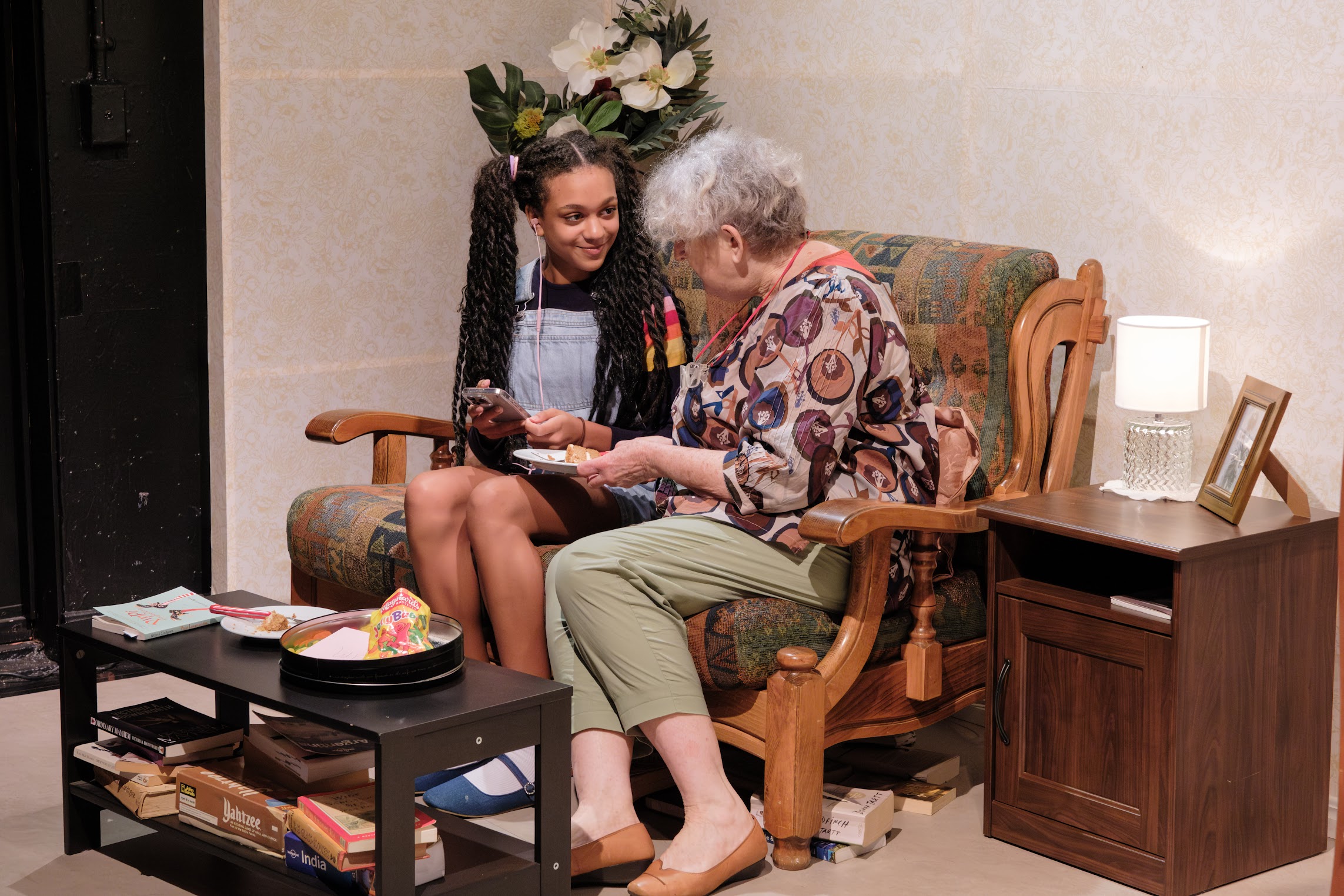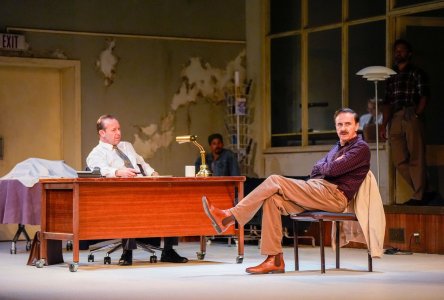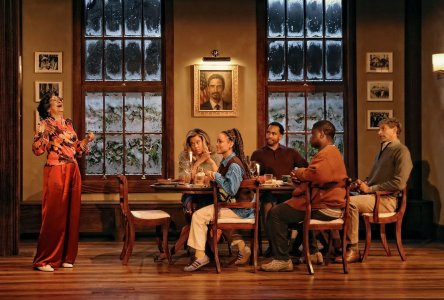
ROMEO AND JULIET
The Most Excellent and Lamentable Tragedy of ROMEO AND JULIET, Sydney Theatre Company at the Drama Theatre, Sydney Opera House, 21 September-31 October 2013. Photos by Lisa Tomasetti, above: Eryn Jean Norvill and Julie Forsyth; right: Eryn Jean Norvill, Mitchell Butel and Dylan Young.
From fair Verona in the 1590s to George Street, Sydney on a Saturday night in 2013 is not much of a stretch in Kip Williams' brilliant, dynamic adaptation of Shakespeare's most searing tragedy.
"Searing" because he's focused on the younger generation of Capulets and Montagus and it's so much more painful to see the self destruction and society's destruction of youth than it is to watch a mob of should-have-known-betters do the same thing.
Williams has reduced the 20 plus characters to 10 and in so doing, most of the Montagus and their entourage are absent (from the stage); but the balance of the script and the story it tells are so well reasoned, you would have to be a lemon-sucking purist of the oldest, deadest school to take issue with the result.
This new emphasis is signalled right at the beginning as Juliet steps forward to deliver the prologue - usually spoken by "chorus" or one or other of the also-rans. Making her STC debut, previous Sydney Theatre Award-winner Eryn Jean Norvill owns the action from these opening moments. She is at first exquisitely childlike, radiating its innocence and hauteur. Then she steadily tiptoes towards the edge of womanhood before tumbling passionately and totally into first and fatal love. It's a marvellously truthful and intelligent performance.
(Williams has described Romeo and Juliet as "proto-Hamlets", in the Shakespearean scheme of things and it would be fascinating to see Norvill take on the Prince of Denmark…)
Meanwhile, this Romeo and Juliet is a chiaroscuro of back alleys, bright lights, dark alleys, bright lights, perilous doors, bright lights, vast and dangerous spaces. It's achieved through a bleak, monumental, fast revolving set that alternately reveals, conceals and spews forth the menacing, murderous intrigue. David Fleischer's set and Nicholas Rayment's lighting are integral performers in a place the director describes as of "…excessive wealth, unchecked ego, dominant patriarchs, packs of arrogant young men…" in a world where "violence is born of boredom, habit, alcoholism and ego." As previously noted - it's like George Street on any weekend night - with extra ego.
As well as the virtuosic setting - the temperamental revolve caused a delay in opening the show and once you've seen it, you'll understand why that bit of machinery is vital to the action - Williams has assembled a wonderful cast. As well as the pivotal Norvill, and a fine and unselfish foil from Akos Armont as the lads' mate Benvolio, there is an unusually mesmerising Mercutio in Eamon Farren. He is a vividly alive, irritating, charming, febrile and sexy friend to Romeo and his murder is unusually shocking. It is as if a life really has been extinguished right before your eyes. The air and atmosphere change in an instant and it's terrible.

Similarly, Josh McConville's Tybalt is a creature of such menace and barely suppressed rage and power, it's also shocking when he succumbs to the knife he's been so expertly wielding. The strength of the scenes of fighting and murder are heightened by edge-of-the-seat and uncommonly credible choreography of the violence (fight director Nigel Poulton). Underlying - and underlining - the dreadful arc of the play is a terrific, almost filmic soundtrack of found and composed music by Alan John.
A cornerstone of the production's thinking is Colin Moody as Juliet's father and Anna Lise Phillips as his wife. He is a man whose power, position and patriarchal expectations have coalesced into a roiling mess of molten testosterone. The Lady Capulet reflects all this in a performance of few words but boundless gesture and understanding. Her life is constrained by her role as the duke's wife: little more than an accessory, an ornament and one who lives in constant fear. The terror is not only of his expectations but also - and worse - what happens when these are thwarted. When Juliet says no to his order that she should marry the County Paris it is a cataclysmic moment, made more awful because he beats her…with a pillow.
Paris (Alexander England) and Romeo (Dylan Young) are yin and yang in the suitor landscape. Paris is big and boofy and overflowing with a - genial - sense of entitlement. It doesn't occur to him for a moment that Juliet will be anything but thrilled to be his wife. Romeo is a boy - a starry-eyed, gentle lad; yet to come into his maturity but overcome with joy that Juliet should love him, so far above his hopes and dreams.
The other essential pairing is Friar Laurence (Mitchell Butel) and the Nurse (Julie Forsyth). Not that they are a pair, but they do book-end the story for the young lovers. The Friar and the Nurse represent the love and compassion otherwise missing from their lives - the humour and leavening too. And the appearances of Butel and Forsyth - both great character actors - are like sunshine after a particularly nasty storm.
All in all, everyone involved with this Romeo and Juliet should know they're in a production which, like Sport For Jove's recent Hamlet, redefines and reinvents the play afresh. It's not common to be riveted to the edge of your seat for more than two hours - when you actually know exactly what's going to happen. But Kip Williams and Co have achieved that rare thing of making you think it's all different and to hope against hope that this time…
It's a show for all ages and persuasions - inspiring, exciting, funny, horrifying and moving in unexpected places. Don't miss it, take tissues.



